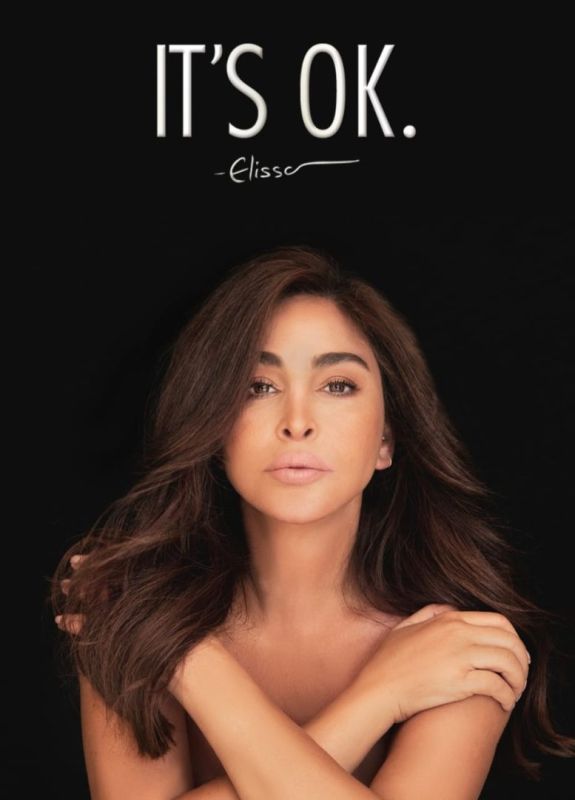
On January 25, Elissa launched on Netflix a documentary about her professional and personal journey titled It’s OK, consisting of three episodes and produced by ‘Different Production.’ The series could have been called ‘The Confessions of Elissa,’ but the title It’s OK immediately immerses us in the life of the singer with a crystalline and velvety voice, recognizable among thousands. Two magical, incantatory words, which she repeats tirelessly when faced with an obstacle, to the point that they now bear her signature. Two words whose complex significance might perhaps explain the phenomenal and enduring success of the artist.
Elissar Khoury was born in Deir el Ahmar. The midwife, who delivered her, handed the baby girl to her grandmother. She disappointedly put her scarf back on her head and left.
From eight to sixteen years old, Elissar was a boarder at a school run by nuns in Feytroun. Her father, whom she cherishes, would walk every weekend to bring her clothes and treats. Along the way, the Arabic language teacher composed poems that he could include in his collections.
At sixteen, while continuing her school studies, Elissar started working to support her family. With her first salary, she bought pots of paint and repainted the house herself, with attention to detail and finishing that heralds her quest for perfection.

She auditioned for the famous talent show 'Studio el Fann' and won only a silver medal. Moreover, the contract signed with the director who was supposed to launch the winners’ careers was quickly broken by him, as he did not see in her the makings of a star, unlike his usual knack for spotting promising talent and guiding them to success.
She worked with the comedian Wassim Tabbara before landing a role in the play 'Ten Hours' by André Jadaa and signing a contract that was also broken. This was the last straw. Elissar held back her rage and did not give up. Her disappointments and anger served as catalysts and fuel to climb to the top. Her plan was already ready. She will work tirelessly to gather all the components of success.
From the start, the teenager, who had big ambitions, wanted to forge her future. She was aware that humans are free enough to change the game. Will luck often smile upon her, or is it the result of her ability to exploit possibilities while giving the best of herself? The story told by the most popular singer in the Arab world does not follow a linear order but accumulates flashbacks and flash-forwards, captivating us and prompting us to find answers.
Another question arises: how has the diva nicknamed 'The Queen of Sensitivity,' who sings from the depths of her soul with a voice that comes from the guts, been able to accumulate such meteoric successes for twenty-five years, releasing an album every two years that propels her to the top of the sales charts without being intoxicated by fame or love, of which she is the best interpreter?
The Fruition of Rage
'It’s OK,' the phrase used by the most popular star in the Middle East, does not betray an escape forward but a determination to confront reality and make the most of it. The scenes from the documentary It’s OK show the star’s categorical refusal to dramatize or play the victim at any painful stage of her journey.
Elissa is always ready to spring forward again, to use failure or unfavorable circumstances to sharpen her experience, toughen up, devise new action plans, and execute them. No matter the constraints and obstacles, her watchwords are work, discipline, attention to detail, and follow-through. It’s not naive optimism that drives her, but a belief in human will, a life lesson bequeathed by her poet father, and wisdom taught by the fertile land of Deir el Ahmar.
“After every dusk, a new dawn rises,” Elissa murmurs, dreamy-eyed. “I give myself an alternative: succeed or... succeed; no other outcome is conceivable,” she also declares in the miniseries.
Elissa has forged everything: her beauty, her voice, her look, her style, and her authentic connections with her audience. She has earned her title as the queen of sales in the Middle East for twenty-five consecutive years, snagging the World Music Award three times in 2005, 2006, and 2010, selling 45 million albums, being followed by over 50 million fans, and founding her own production house. It’s as if she embraced Baudelaire’s words, addressing life: 'You gave me your mud. I made gold out of it.'
The three hardest moments of her life are ranked as follows. First, the death of her father, her idol, whom she adored. Second, the cancer that struck her at the peak of her glory and youth in 2018, and recently, the removal of her new song 'Bel Okd' (With This Necklace) from the YouTube channel by the label distributing her albums; in reality, one of the songs from the first album she produced herself. Surrounded by her close friends, Elissa humbly recounts her revenge. Today, she is building a wonderful house in her native village that will bear the name of Zackaria Khoury, her father. She has won her battle against cancer and won the lawsuit against the distribution company that was depriving her of her rights.
Two Words Summarizing Two Natures
When we talk about sensitivity, we associate it with vulnerability. How can Elissa be so sensitive and so strong at the same time? How does she manage to stir us deeply when she sings, to make us love and desire her melancholy, while she turns into a rock when facing challenges? Where does she, for example, get the courage to loudly express her political preferences and point out leaders who have destroyed the country despite their threats, without fearing the loss of millions of fans, their associates, or their sympathizers?
Elissa is a true daughter of the Lebanese mountains, hardened by the roughness of the heights, slopes, and climate. She is the true daughter of her father, who was described in the documentary as “noble, brave, and a patriot.” Her gratitude for her family, especially her father, her friends, and her work team, is a sign of loyalty and inner peace. She does not change collaborators easily; she expresses her anger and breaks bridges.
Fate placed Angela Sissi on her path, who became her spiritual daughter, providing her with the joys of motherhood, and Elissa does not seem resentful towards the fate that deprives her of bearing children. Fate or cancer? Cancer or the toxic romantic relationship with a man who actually caused it? She undergoes sophisticated tests to find if the cause of the cancer is hereditary. It turns out not to be. She recalls her emotional shock while preparing to get married, her addiction to antidepressants and sedatives, and her plastic surgery operation, which led to a virus and resulted in a severe infection. She almost confesses that all the men in her life have betrayed her.
How to decipher her mystery? Does her secret lie in the presence of two antagonistic and complementary sides within her? What connects them and forms their intersection point? The theme that animates her songs and her life, namely, passion! A passion intelligently channeled, often sublimated, and a vigilance that spares her pitfalls. But also, the refusal to rest on her laurels and the ever-renewed desire to create, to reinvent herself to last, like the succession of seasons in Deir el Ahmar, like life threatening to betray us, as if each time was the first and last time.
View this post on Instagram
Elissar Khoury was born in Deir el Ahmar. The midwife, who delivered her, handed the baby girl to her grandmother. She disappointedly put her scarf back on her head and left.
From eight to sixteen years old, Elissar was a boarder at a school run by nuns in Feytroun. Her father, whom she cherishes, would walk every weekend to bring her clothes and treats. Along the way, the Arabic language teacher composed poems that he could include in his collections.
At sixteen, while continuing her school studies, Elissar started working to support her family. With her first salary, she bought pots of paint and repainted the house herself, with attention to detail and finishing that heralds her quest for perfection.

She auditioned for the famous talent show 'Studio el Fann' and won only a silver medal. Moreover, the contract signed with the director who was supposed to launch the winners’ careers was quickly broken by him, as he did not see in her the makings of a star, unlike his usual knack for spotting promising talent and guiding them to success.
She worked with the comedian Wassim Tabbara before landing a role in the play 'Ten Hours' by André Jadaa and signing a contract that was also broken. This was the last straw. Elissar held back her rage and did not give up. Her disappointments and anger served as catalysts and fuel to climb to the top. Her plan was already ready. She will work tirelessly to gather all the components of success.
From the start, the teenager, who had big ambitions, wanted to forge her future. She was aware that humans are free enough to change the game. Will luck often smile upon her, or is it the result of her ability to exploit possibilities while giving the best of herself? The story told by the most popular singer in the Arab world does not follow a linear order but accumulates flashbacks and flash-forwards, captivating us and prompting us to find answers.
Another question arises: how has the diva nicknamed 'The Queen of Sensitivity,' who sings from the depths of her soul with a voice that comes from the guts, been able to accumulate such meteoric successes for twenty-five years, releasing an album every two years that propels her to the top of the sales charts without being intoxicated by fame or love, of which she is the best interpreter?
The Fruition of Rage
'It’s OK,' the phrase used by the most popular star in the Middle East, does not betray an escape forward but a determination to confront reality and make the most of it. The scenes from the documentary It’s OK show the star’s categorical refusal to dramatize or play the victim at any painful stage of her journey.
Elissa is always ready to spring forward again, to use failure or unfavorable circumstances to sharpen her experience, toughen up, devise new action plans, and execute them. No matter the constraints and obstacles, her watchwords are work, discipline, attention to detail, and follow-through. It’s not naive optimism that drives her, but a belief in human will, a life lesson bequeathed by her poet father, and wisdom taught by the fertile land of Deir el Ahmar.
“After every dusk, a new dawn rises,” Elissa murmurs, dreamy-eyed. “I give myself an alternative: succeed or... succeed; no other outcome is conceivable,” she also declares in the miniseries.
Elissa has forged everything: her beauty, her voice, her look, her style, and her authentic connections with her audience. She has earned her title as the queen of sales in the Middle East for twenty-five consecutive years, snagging the World Music Award three times in 2005, 2006, and 2010, selling 45 million albums, being followed by over 50 million fans, and founding her own production house. It’s as if she embraced Baudelaire’s words, addressing life: 'You gave me your mud. I made gold out of it.'
The three hardest moments of her life are ranked as follows. First, the death of her father, her idol, whom she adored. Second, the cancer that struck her at the peak of her glory and youth in 2018, and recently, the removal of her new song 'Bel Okd' (With This Necklace) from the YouTube channel by the label distributing her albums; in reality, one of the songs from the first album she produced herself. Surrounded by her close friends, Elissa humbly recounts her revenge. Today, she is building a wonderful house in her native village that will bear the name of Zackaria Khoury, her father. She has won her battle against cancer and won the lawsuit against the distribution company that was depriving her of her rights.
Two Words Summarizing Two Natures
When we talk about sensitivity, we associate it with vulnerability. How can Elissa be so sensitive and so strong at the same time? How does she manage to stir us deeply when she sings, to make us love and desire her melancholy, while she turns into a rock when facing challenges? Where does she, for example, get the courage to loudly express her political preferences and point out leaders who have destroyed the country despite their threats, without fearing the loss of millions of fans, their associates, or their sympathizers?
Elissa is a true daughter of the Lebanese mountains, hardened by the roughness of the heights, slopes, and climate. She is the true daughter of her father, who was described in the documentary as “noble, brave, and a patriot.” Her gratitude for her family, especially her father, her friends, and her work team, is a sign of loyalty and inner peace. She does not change collaborators easily; she expresses her anger and breaks bridges.
Fate placed Angela Sissi on her path, who became her spiritual daughter, providing her with the joys of motherhood, and Elissa does not seem resentful towards the fate that deprives her of bearing children. Fate or cancer? Cancer or the toxic romantic relationship with a man who actually caused it? She undergoes sophisticated tests to find if the cause of the cancer is hereditary. It turns out not to be. She recalls her emotional shock while preparing to get married, her addiction to antidepressants and sedatives, and her plastic surgery operation, which led to a virus and resulted in a severe infection. She almost confesses that all the men in her life have betrayed her.
How to decipher her mystery? Does her secret lie in the presence of two antagonistic and complementary sides within her? What connects them and forms their intersection point? The theme that animates her songs and her life, namely, passion! A passion intelligently channeled, often sublimated, and a vigilance that spares her pitfalls. But also, the refusal to rest on her laurels and the ever-renewed desire to create, to reinvent herself to last, like the succession of seasons in Deir el Ahmar, like life threatening to betray us, as if each time was the first and last time.
Read more



Comments